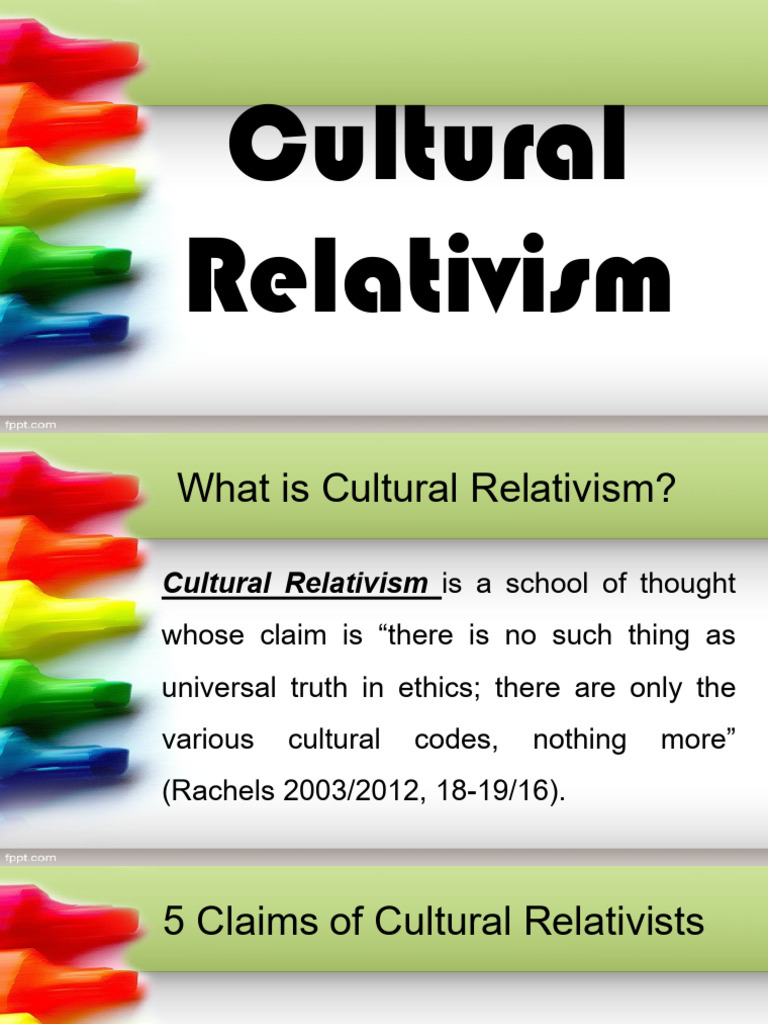Cultural relativism is a philosophical and sociological concept that serves as a fulcrum for debates about morality, ethics, and the very nature of human understanding. At its core, cultural relativism posits that a person’s beliefs and activities should be understood based on that person’s own culture, rather than be judged against the criteria of another culture. This viewpoint challenges the often implicit ethnocentrism present in global interactions and promotes the idea that no culture is intrinsically superior to another.
One of the primary observations that elicits fascination with cultural relativism is its capacity to elucidate the myriad divergences in moral standards and practices across various societies. These variations can be striking; what is deemed acceptable in one culture may be viewed as abhorrent in another. For instance, practices surrounding marriage, sexuality, and even dietary choices can vastly differ, revealing a perplexing tapestry of human values and ethics intertwined with the local traditions and historical contexts.
At a deeper intellectual level, cultural relativism compels us to scrutinize the frameworks through which we evaluate behavior and moral judgments. This scrutiny often reveals the biases ingrained within our perception. An observer from a Western context may instinctively disapprove of certain traditions or norms prevalent in Eastern societies, yet such judgments frequently stem from a lack of understanding or appreciation for the cultural contexts that shape those norms. Thus, cultural relativism serves as a cognitive tool, allowing for more nuanced perspectives on human behavior and fostering cross-cultural dialogue.
To better understand cultural relativism, it is vital to delineate its two primary manifestations: descriptive and normative cultural relativism. Descriptive cultural relativism pertains to the observation that different cultures exhibit varying moral codes and practices. It is an empirical recognition of cultural diversity, backed by anthropological evidence that highlights how societal norms are influenced by local conditions, historical developments, and collective experiences.
In stark contrast lies normative cultural relativism, which extends beyond mere observation to assert that the moral standards of a culture are valid solely within that specific cultural framework. This has profound implications for ethical discussions. For example, while one culture may deem a practice, such as polygamy, morally reprehensible, another may see it as a viable and ethically justified lifestyle choice. In this sense, normative cultural relativism invites individuals to adopt a posture of tolerance, fostering an environment where disparate cultures can coexist and engage without the weight of moral supremacy dictating the discourse.
However, the apotheosis of cultural relativism lays bare its own set of complexities and challenges. Critics argue that if all moral standards are seen as equally valid, this could lead to a form of moral nihilism, where there are no universal ethical principles to guide behavior. Such a stance raises questions regarding human rights, justice, and accountability. Can a culture justify practices that infringe on basic human rights under the banner of cultural relativism? This dilemma becomes particularly palpable in discussions about issues like female genital mutilation, human trafficking, and resistance to LGBTQ+ rights, which frequently attract ire from the global community.
This contention has led to a schism in academic and ethical circles, resulting in the emergence of a more moderate position known as “critical cultural relativism.” This perspective seeks to balance respect for cultural diversity with the recognition that certain human rights are fundamental and should transcend cultural boundaries. Proponents of this viewpoint argue that while it is essential to understand and appreciate cultural contexts, there are fundamental ethical standards that should be universally upheld—such as the prohibition of torture or the enforcement of basic civil rights.
Moreover, the inscriptions of cultural relativism are not limited to anthropological studies; they penetrate the domains of global politics, international relations, and even environmental ethics. In an increasingly interconnected world, understanding that different societies have distinct values regarding environmental stewardship can illuminate why certain global initiatives face resistance. In many indigenous cultures, for instance, the relationship with nature is often seen as sacred and integral to their identity, a perspective that may clash with the capitalist, industrial worldview prevalent in many Western contexts.
As humanity grapples with significant issues like climate change, the insights offered by cultural relativism are invaluable. Acknowledging that different cultures possess varying frameworks for interacting with the environment can facilitate more effective cooperative efforts toward sustainability. Such initiatives must respect local values while fostering dialogue that transcends cultural differences. Emphasizing a cross-cultural exchange can lead to innovative solutions that resonate with distinct cultural narratives while addressing global imperatives.
Ultimately, cultural relativism is not merely an academic concept; it embodies a critical lens through which to view our interactions with the world. Engaging with its principles encourages a deeper understanding of human diversity, fostering empathy and respect. In a time of rapid globalization, where cultural boundaries continue to blur, the relevance of understanding this paradigm continues to grow. Embracing cultural relativism can pave the way for better communication, conflict resolution, and cooperative action as humanity collectively confronts the challenges that transcend national and cultural boundaries.
